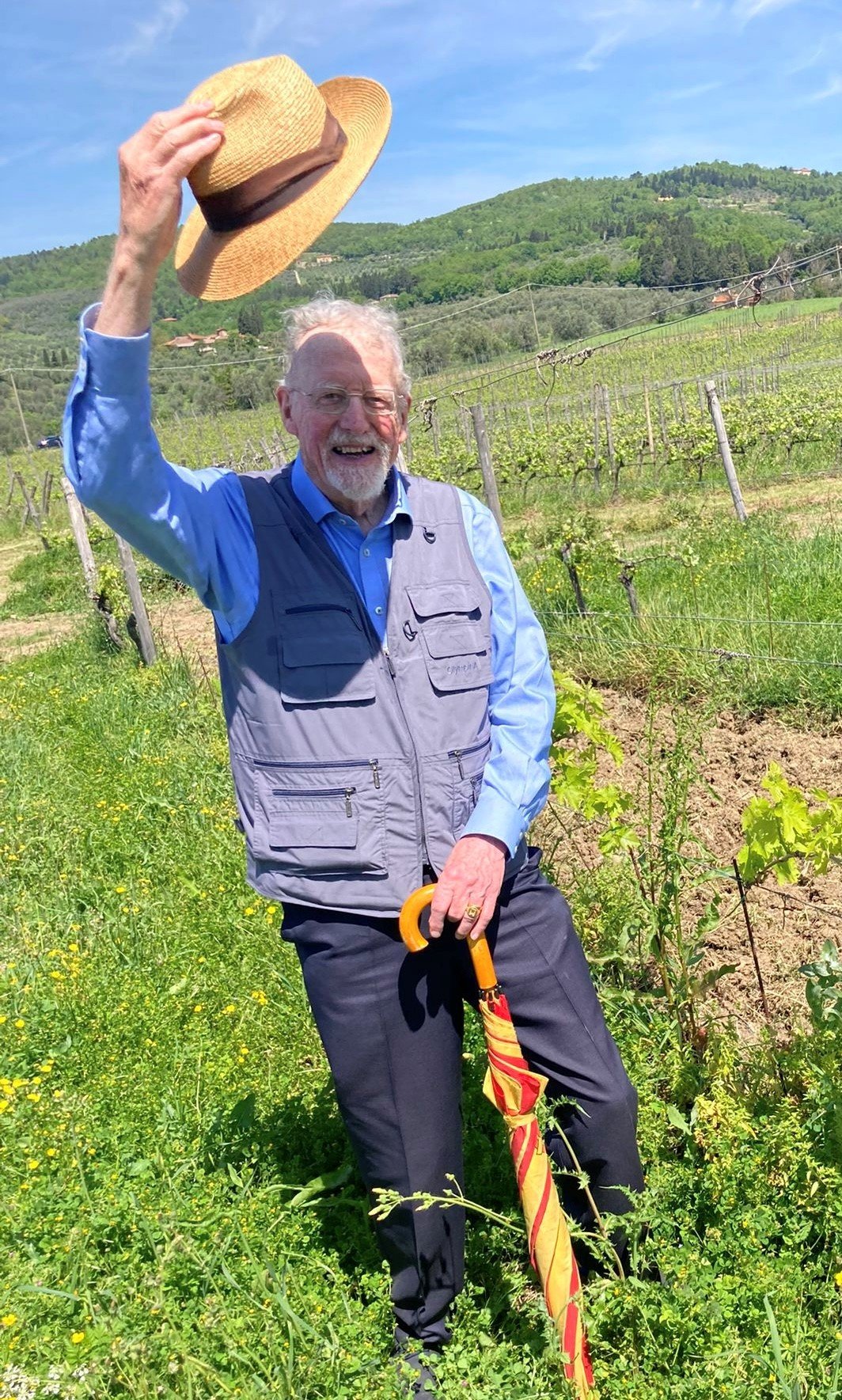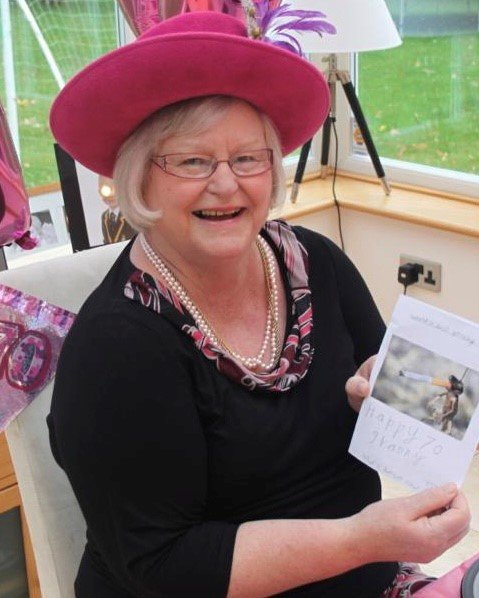A Grandparent’s Grief
Peter Hime has spent many decades as a Divisional CEO within multinational companies and Chairman across multiple industries and not for profits, with his main focus being on management training and ‘problem-solving.’
However, his role as parent and grandparent in supporting his family through devastating child deaths and grief has perhaps been the most challenging.
Here, in his personal reflections, he generously shares his experiences and tips for making death a part of life with children.
Peter's family have consented to him sharing his story, but any photos included in this blog are not of their children.Scroll down for Peter’s Top Five Tips for supporting a child through grief.
Scroll down for Peter’s Top Five Tips for supporting a child through grief.
Where I fit in to this story
“For just over 50 years, until my wife Rosie’s death to cancer at 9:30am July 7, 2017, my role has been as a husband, father, uncle and grandfather to ten wonderfully mad people. Sadly, three grandchildren died; one at nine weeks, another at six months, and the last at one week short of seven years.
Solomon, Eve and Bethany all died of unrelated causes, and are all the children of my eldest son, and his amazing wife. They now have just two children, aged 21, and 13.”
The deaths of Bethany, Eve, and Solomon
“These awful tragedies happened over a six-year period within my son’s family. Eve suffered from a highly contagious strain of Meningitis, Solomon from a congenital heart condition, and Bethany, a few years later of a subarachnoid hematoma. The courageous and loving manner in which my son and daughter in law have dealt with this period in our lives is an example to us all.”
Why is death such a taboo?
“Not knowing exactly what happens after death creates the fear of the unknown, particularly for children. Something unknown, by its very nature, appears frightening. To reinforce the negativity around death, the less you know or talk about this subject, the more unsettling it is for children. Make it stand out
“So stupidly, the one single certainty in life, death, is seldom mentioned.”
Because of our outmoded thoughts and notions around death, it is often seen as an experience not to be mentioned. So, when Bethany died at nearly seven years old, when friends saw us, instead of coming to us to give us a hug, some of them crossed the road to avoid us!
Men can cry at the loss of a loved one. It makes them feel better. Laughter is allowed when grieving or at Thanksgiving Services. When my wife, Rose’s basket-weaved coffin was brought into the packed church, suddenly some people were smiling and laughing! Stencilled on the side of the basket, just like her Christmas hampers, were the initials, F&M. More than one person commented to me that it was the funniest and happiest Thanksgiving Service they have ever attended.”
The impact of grandparents on children who have lost a sibling
“As a grandparent, one is in a unique position to have a great deal of subtle influence upon a child’s response to death.”
“Because a grandparent does not normally directly, and on a daily basis, influence grandchildren, or often discipline them, they are very much seen as a loving grown up, who appears to listen to them with more attention, perhaps precisely because they know the child in a different way to their parents.
It is therefore easier for a grandparent to gently tease out the concerns and worries that both children and parents have at this highly emotional period in their joint lives. They will see their parents in an emotional and physical state that they have never before experienced. Their mirroring of their parents’ behaviour, whilst natural, tends to magnify itself on the parent, often resulting in further upset. The grandparent, whilst listening and encouraging grandchildren to discuss death can redirect their worries, in a way that brings comfort to a difficult and sad situation.”
“To coin a phrase, ‘A hug from a grandparent, an expression of love to a child,’ is far more comforting, than trying to explain in depth what has happened. That sadly, you will not see your sibling alive, ever again on earth.”
Why talking about death is so important and vital to a child’s mental health
“In the early years of a child’s life, it is very easy to build a simple approach to death and its consequences; animals die, as do goldfish! I can remember ceremoniously placing a dead goldfish in a toffee tin which was then buried in the garden. As I understood it, that’s where we would all end up, or somewhere similar. We then thanked the goldfish for the fun they had given us, and promptly brought another one back from a local fair.
“To a child who has never experienced the death of anyone or anything, the sudden awareness that human life is not forever, is a shock and really does defy all understanding.”
From an early age we encouraged our children to wave farewell to their dogs when they died. While death is near impossible to explain to a child, the inevitability of all life around dying is a far easier concept when set in practical ways. What would happen if all animals kept on having baby animals that never died? Or wasps or people? A simple analogy; insufficient food, we would all starve and have nowhere to live!”
Scroll down for Peter’s Top Five Tips for supporting a child through grief.
Scroll down for Peter’s Top Five Tips for supporting a child through grief.
Grieving for my wife of over 50 years
“When my wife died I was largely unaware of the effect that this would have on me, both in terms of behaviour and relationships. Some kind friends sent me books on grieving that in no way addressed the issues that I needed help with. Some of the suggestions were quite unable to recognise the large gaps in my life that I needed to come to terms with.
“What was so awful then about those books sent to me, to help with my grief? Absolutely none of them addressed the fundamental changes that I had to deal with: I was alone, my life partner was no longer in my presence; I was not part of a team called, ‘Peter & Rose’. I heard no echo to my thoughts.”
‘Who am I?’ ‘What is my role?’ ‘How can I support others as they support me?’ Amongst all the questions I had there were two very fundamental ones. The first: How can I survive without my, ‘Morning Voice’ that sets the day’s issues and priorities, and that at numerous times in the day cross checks that all is right, or says nothing and simply brings in a glass of wine? The largely inter-relationship, that isn’t spoken of directly, as it has taken over 50 years to evolve.
“Rose’s death caused a crucial evolution in me as a father and grandfather, as well as a human being. I quickly realised I could have a different kind of fun with my grandchildren. I found this particularly with the girls; ‘What would Rosie have done to celebrate special occasions?”
‘I know before you go into the sixth form, Granny would have taken you out to buy some clothes. Right let’s do that. Short of cash? You’re in luck. Granny still has some in her bank account.’ No, of course they didn’t believe me, but we enjoyed the game and remembering and talking about their equally crazy and loving Granny, just as I continue to talk to her. ‘Ok Rose, what should I have done?’”
End of Life Celebrations
“Modern medicine and hospices have given us a wonderful opportunity to be with our loved ones and to demonstrate our love to our dying relatives and friends. My wife died of cancer after a long and well fought struggle. Although comfortable in the knowledge that she, as a Christian would go to Heaven, she was not at that time quite ready to go.
“In the last few weeks when it was clear that cancer had spread its ugly shadow over her whole body we asked her, is there anything mad she’s like us to do? The answer was, ‘Let’s celebrate Christmas!’”
It was her favourite time of the family’s year. We took over a large house by the sea, and over a long weekend in June, amongst all my mad children, Christmas was organised.
In the end my immediate family and grandchildren, 15 in total, arrived, as well as hampers, presents and cards. We even managed to get Rosie sitting on the rocks by the sandy beach, drinking a glass of champagne. It was utterly wonderful. In the last weeks of her life everyone visited her. Our children and some of her grandchildren were around her bed as I held her hand and she slipped away.
“The important thing is not how you celebrate, it is that everyone’s’ life at whatever age, should be celebrated. That is what our son, and our daughter in law, taught our family.”
Keeping memories alive
“When someone dies, the contribution they have made to all of us doesn’t suddenly become debased, valueless; it lives on in our memories. People still remember Rosie six years since her death. Not just for her friendship, support and help she gave to people and of herself, but the fun and laughter, the sad and mad times, and yes, that F&M Basket. Who instigated that? Our son, who knows all about grieving, as does, his wife, having lost three children.
“Nothing should stop someone from talking and thinking positively of those who have died. It’s perfectly naturally to surmise, what would Bethany have gone on to do? She would have been 21 years old today.”
Peter’s top five tips for supporting a grandchild through grief
Be aware that even old or close friends may find it difficult to know what to do or say. To avoid awkwardness, they may even avoid meeting you in the street. If you need a hug, it could well be up to you to hug them!
Remember that while grieving, you’re allowed to laugh and think of happy times with those who have died. It’s also perfectly natural and cathartic for people to cry when sad, for men as well as women.
A hug from a grandparent can be far more comforting to a child than trying to explain in depth what has happened to their sibling.
Due to the experience of losing a sibling, a child may be suddenly aware of the fact that they will not live forever. In the early years of a child’s life, it is important to simply explain death in a straightforward way if asked.
If children want to talk about their sibling, let them. Nothing should stop anyone from talking about someone who has died; it shouldn’t be taboo.
If you are looking for further guidance on how to support children through grief, here are some helpful links:
Child Bereavement UK: Helping our grandchildren when a child has died.
The Compassionate Friends: Supporting family after a child dies.
SANDS: A support booklet for when a grandchild dies before, during or shortly after birth.





